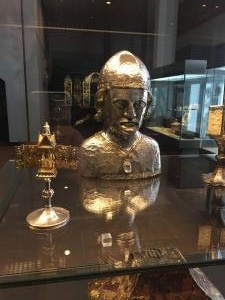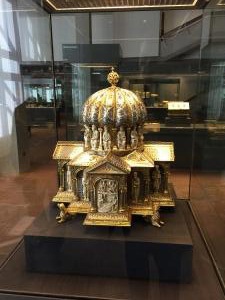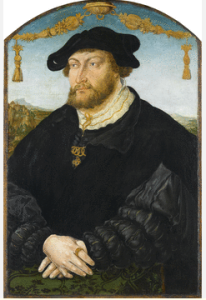The decision on Friday to allow our clients’ claims to proceed against German and the Stiftung Preussischer Kulturbesitz for the restitution of the Guelph Treasure (or Welfenschatz) is ground-breaking in important respects, and a welcome part of a consistent progression in the law of sovereign immunity over claims for Nazi-looted art. As we noted in our initial reaction, it is the first decision in which a U.S. court has held that it has jurisdiction over Germany or an agency or instrumentality of it under the Foreign Sovereign Immunities Act (FSIA) for a claim to Nazi-looted or purchased art—though others have certainly tried—in this case finding the so-called expropriation exception applies. Critically, it recognizes that claims about forced sales in the early days of Nazi persecution indeed create jurisdiction. Moreover, the court agreed with our clients that Germany’s various excuses to avoid litigating the substance of a forced sale involving Hermann Goering based on pleas for deference or respect to the flawed Advisory Commission are no reason to dismiss the case.
Nazi-Looting and Forced Sales Support Jurisdiction—Guelph Treasure Ruling Analysis
Topics: Germany, Nazi-looted art, Foreign Sovereign Immunities Act, SPK, Advisory Commission, Stiftung Preussischer Kulturbesitz, Hermann Goering, FSIA, Preemption, expropriation exception”, NS Raubkunst, sovereign immunity, Welfenschatz, HEAR Act
U.S. District Court Issues First of Its Kind Ruling Against Germany Over Renowned Guelph Treasure
Under Landmark Ruling, Germany Must Now Defend Nazi-Looted Art Claims in U.S. Court
WASHINGTON (March 31, 2017)- The United States District Court for the District of Columbia has ruled that claims over the famed Guelph Treasure can proceed against Germany in a United States court. This is the first time Germany will have to defend itself in the U.S. against allegations of looted Nazi art and artifacts. The claims arise out of the 1935 forced sale by a consortium of Jewish art dealers to Hermann Goering’s minions of the famed collection of medieval artifacts known as the Guelph Treasure. The claims were filed by clients of Sullivan & Worcester LLP against the Federal Republic of Germany and the Prussian Cultural Heritage Foundation (the Stiftung Preussischer Kulturbesitz, or SPK). The court rejected the Defendants’ arguments that they are immune from suit and held that the Plaintiffs’ claims can be considered a taking of property in violation of international law for the purpose of evaluating the court’s jurisdiction over Germany and the SPK.. Jed Leiber, Alan Philipp, and Gerald Stiebel may now proceed to litigate their claims for their property’s rightful return. Leiber, Philipp, and Stiebel are also represented by S&W’s co-counsel in this matter, Markus Stötzel and Mel Urbach, experienced counselors in the return of Nazi-looted art who have been fighting this case for over eight years and who decried Germany continuing to defend the Nazis’ and Herman Goering’s theft from Jews.
Topics: Nazi-looted art, Foreign Sovereign Immunities Act, Mel Urbach, SPK, Stiftung Preussischer Kulturbesitz, Hermann Goering, FSIA, expropriation exception”, NS Raubkunst, J.S. Goldschmidt, Markus Stötzel, Saemy Rosenberg, Adolf Hitler, Federal Republic of Germany, Zacharias Hackenbroch, Nicholas M. O'Donnell, Welfenschatz, I. Rosenbaum, Paul Körner, Wannsee Conference
Widespread Criticism Continues from Historians Over Germany’s and SPK’s Revisionism Concerning Holocaust and Forced Sales of Art
We reported last week on the outrage over the decision by Germany and the Stiftung Preussischer Kulturbesitz (SPK) to argue in their motion to dismiss my clients’ claims to the Welfenschatz that a commercial interaction between German Jews and a cabal instigated by Hermann Goering in 1935 “predated the Holocaust by several years.” As we noted last week, the suggestion that the Holocaust was a distant possibility in 1935 was an indefensible statement, factually, historically, and ethically. The initial reaction was swift and severe. As Germany gets ready to host the First Conference of the German Centre for Cultural Property Losses next week, its policies are hurtling in the wrong direction.
Topics: Jewish Week Mel Urbach, Hermann Goering First Conference of the German Cen, Gesetz zur Wiederherstellung des Berufsbeamtentums, Henning Kahmann, Atlanta, Simon Wiesenthal Center, Varda Neumann Federal Administrative Court, Yale University, Marion Kaplan, New York University, Germany, Nazi-looted art, Hitler, Kristallnacht Rabbi Abraham Cooper, Deborah Lipstadt, U.S. Holocaust Memorial Museum, Markus Stoetzel, Emory University, Behrens, Holocaust, Bloodlands, SPK, Advisory Commission, Black Earth: The Holocaust as History and Warning, Stiftung Preussischer Kulturbesitz, Restitution, Los Angeles, World War II, Law for the Restoration of the Professional Civil, Washington, Raubkunst, Timothy Snyder, Welfenschatz
Holocaust Revisionism in German Motion to Dismiss Guelph Claim Elicits Condemnation
Germany Runs Counter to 20 Years of International Commitments
As readers know, my clients Alan Philipp and Gerald Stiebel sued the Federal Republic of Germany and the Stiftung Preussischer Kulturbesitz (SPK) in February for restitution of the Guelph Treasure (or Welfenschatz as it is known in Germany), assisted by my co-counsel Mel Urbach, Esq. and Markus Stötzel of Marburg, Germany. As my co-counsel speak to an event tonight hosted by Congresswoman Grace Meng on the anniversary of Kristallnacht, an event inextricable to the persecution of Jews in Europe, Germany’s response to the Complaint advances a stunning revisionism about the Holocaust and the international commitments that Germany has made. While paying lip service to the seriousness of Jewish suffering, the papers filed in court are nothing less than an attempt to move the goalposts to exempt a historical period from responsibility about which there can be no serious debate. Independent condemnation was not far behind the filing.
Topics: Grace Meng, Simon Wiesenthal Center, Shoah, Adolph von Menzel, Hans Sachs, Washington Principles on Nazi-Looted Art, 1943 London Inter-Allied Declaration, Dachau, Holocaust, Mel Urbach, SPK, George Eduard Behrens, Nuremberg race laws, Holocaust revisionism, Stiftung Preussischer Kulturbesitz, Marburg, Restitution, Los Angeles, Gerald Stiebel, World War II, Markus Stötzel, Saemy Rosenberg, Deutsches Historisches Museum, Reichskristallnacht, Isaac Rosenbaum, Lucie Ruth Hackenbroch, Federal Republic of Germany, Zacharias Hackenbroch, Pariser Wochentag, Rabbi Abraham Cooper, Paris Weekday, Alan Philipp, Welfenschatz, Military Government Law 59, Frankfurt
Staatsgalerie Stuttgart Restitutes Wertinger Painting to Rosenbaum and Rosenberg Heirs, Citing Importance of Blocked Accounts That Also Support Guelph Treasure Claim
The Staatsgalerie Stuttgart has agreed to return Bildnis Pfalzgraf Johann III (Portrait of Elector-Palatine Johann III), ca. 1526, by Hans Wertinger to the heirs of the art dealers Saemy Rosenberg and Isaak Rosenbaum, the owners of the art dealer firm I. Rosenbaum in Frankfurt. Rosenbaum and Rosenberg sold the Wertinger in 1936, but the proceeds were paid into a Nazi-blocked account. The work eventually ended up with collector Heinrich Scheufelen in 1948.
Topics: Stefan Koldehoff, Joint Declaration, Nazi-looted art, Baden-Württemberg, Washington Principles on Nazi-Looted Art, Heinrich Scheufelen, Die Bilder Sind Unter Uns, SPK, Portrait of Elector-Palatine Johann III, Stiftung Preussischer Kulturbesitz, Nazi terror, Isaak Rosenbaum, Deutschlandfunk, Restitution, coerced sale, World War II, Staatsgalerie Stuttgart, Saemy Rosenberg, Jürgen Walter, Museums, forced sale, Zacharias Hackenbroch, Bildnis Pfalzgraf Johann III, Welfenschatz, The Pictures Are Under Us, I. Rosenbaum, Frankfurt






